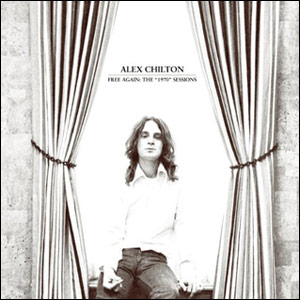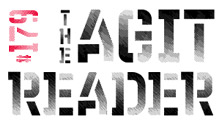
Free Again: The ”1970“ Sessions
Omnivore
In many ways Alex Chilton was the Southern Lou Reed, although by all reports he was never the curmudgeon that his New York compatriot has become. But his Big Star was every much the Velvet Undeground’s equal, and though he and Reed explored similar early forms of rock & roll while gaining their feet underneath them, Chilton was scoring hit records as the voice of the Box Tops while Reed was singing on street corners. As such, Chilton was probably as much to Memphis as Reed was to New York, however reluctantly.
Transitioning from the Box Tops’ soulful pop to the writerly fare of his later career was a difficult rite of passage for Chilton. While his work with the all too short-lived Big Star is exemplary, a cursory look and listen at his solo output will show the singer struggling to find his voice. Amongst his later releases, he was still faltering between odd renditions of rock & roll classics, deconstructed folk and his new endeavors into left-of-center rock. There’s been countless revisitations of this period, and records like Lost Decade revealed very little about Chilton that we didn’t already know.
Fortunately, Free Again: The “1970” Sessions captures Chilton at a crucial time. Fed up with being a pawn in the Box Tops game, Chilton struck out on his own in 1969. He enlisted a bevy of talent at Ardent Studios in Memphis to collaborate on his first endeavor outside the Box Tops. Anyone familiar with Chilton’s idiosyncratic takes on covers and originals that have appeared on his solo albums in varying conditions would have good reason to not lift an eyebrow. But Free Again is as good a Chilton album as there has ever been. With virtuoso Terry Manning helping out, Chilton tackles renditions of “Jumpin’ Jack Flash” and “Sugar, Sugar” more spirited than the originals, while also doing versions of originals like“Free Again” and “The EMI Song” that are better than anything that subsequently ended up on his proper records.
Indeed that’s what truly amazing about Free Again, that so much of this unheard material eclipses what has become Chilton’s known discography. Omnivore’s remastering has helped lend a sonic piquancy that might have been missing, but I doubt that there was little absent from these amazing recordings. Chilton’s work with the Box Tops and Big Star always overshadowed the bulk of his career (as a solo performer) because he seemed to always be making records off the cuff with little regard to sound or situation. 1970 puts everything straight. This is an album that is soulful, gritty and smart—in other words, full of the kind of stuff that much of today’s hipster rock eschews in favor of cynicism and trite mimicry. There is a purity to this record that is very rare, and however simple it may sound on paper, it continues to amaze on the stereo.
Stephen Slaybaugh
PAST PERFECTS
Boddie Recording Company: Cleveland, Ohio
Smashing Pumpkins, Gish and Siamese Dream
U2, Achtung Baby
Can, Tago Mago
Leonard Cohen, The Complete Albums Collection
The Smiths, Complete
Void, Sessions 1981-83
Fac. Dance: Factory Records 12" Mixes & Rarities 1980-1987
Gregory Isaacs, The Ruler: 1972-1990
The Jimi Hendrix Experience, Winterland
Social Climbers
This May Be My Last Time Singing
Superchunk, Foolish
The George-Edwards Group, Archives
